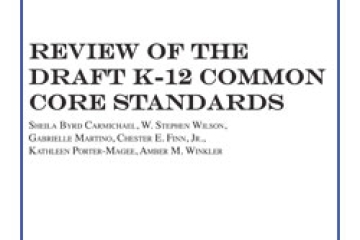The Common Core State Standards (CCSS) for English language arts and mathematics represent a sea change in standards-based reform and their implementation is the movement’s next—and greatest—challenge. Yet, while most states have now set forth implementation plans, these tomes seldom address the crucial matter of cost. Putting a Price Tag on the Common Core: How Much Will Smart Implementation Cost? estimates the implementation cost for each of the forty-five states (and the District of Columbia) that have adopted the Common Core State Standards and shows that costs naturally depend on how states approach implementation. Authors Patrick J. Murphy of the University of San Francisco and Elliot Regenstein of EducationCounsel LLC illustrate this with three models:
- Business as Usual. This “traditional” (and priciest) approach to standards-implementation involves buying hard-copy textbooks, administering annual student assessments on paper, and delivering in-person professional development to all teachers.
- Bare Bones. This lowest-cost alternative employs open-source instructional materials, annual computer-administered assessments, and online professional development via webinars and modules.
- Balanced Implementation. This is a blend of approaches, some of them apt to be effective as well as relatively cost-efficient.
The report examines the tradeoffs associated with each strategy and estimates how much the three approaches would cost each state that has adopted the Common Core. The authors also point out that, since states already invest billions annually in professional development, assessments, textbooks, and other expenses in connection with existing standards, proper forecasting of Common Core costs should “net out” the sums that states would spend anyway for activities that this implementation process will replace.
To learn more, download the report and watch the replay of panel discussion on the topic, Pricing the Common Core: How Much Will Smart Implementation Cost States and Districts? Also, watch the short video below on the study's findings, featuring Fordham Institute Vice President for Research Amber Winkler.



